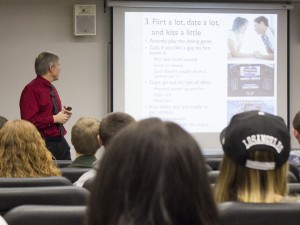BYU’s Women’s Services hosted a Dating Conference Feb. 13 in the Wilkinson Student Center and covered a variety of topics including marriage preparation, finding “the one,” body image and self-improvement.

“We’ve been doing the dating conference for a while,” said event coordinator Katie Bell. “We do it annually for Valentine’s Day. … LaNae, our director, came up with it originally.”
Director LaNae Valentine explained why this event was so important to her. “I feel kind of strong of helping people be aware of what a healthy relationship is,” she said.
Professor E. Jeffrey Hill gave the first speech of the conference. The topic he spoke on was “Top 10 things you can do to prepare for marriage.”
Some of the points he mentioned were the importance for all to be Christlike, properly deal with finances and learning basic skills such as cleaning and cooking as well as sharing.
Hill also mentioned Gary Chapman’s Love languages.
“One of the key things about marriage is love. Usually we get married to someone we’re in love with,” said Hill. “The second thing that we can do to prepare is to understand about different love languages. Each of us have a certain way, or a couple of ways, that we like to express love.”
In her speech, Valentine spoke about how dating should be a learning experience and one should be able to learn something from every experience.
“Even dating the so-called wrong person or going through a relationship that doesn’t work out is still a good experience,” Valentine said. “Because you’re learning stuff about yourself and you’re learning stuff about what’s of value and what you need and what’s important.”
Valentine also mentioned the difference between red flags and deal-breakers in a relationship.
“So a red flag doesn’t necessarily mean ‘Don’t go with this person anymore’; it just means, ‘Ok here’s something that’s of concern, and you should address it.'” Valentine said. “And sometimes when you address it, you can work through it, and it works out and the red flag goes away.”
Valentine said being able to address and find solutions to red flags in relationships indicates that the relationship is healthy.
The other speakers were Counseling and Psychological Services’s Marty Erickson and Lauren Barnes from Marriage and Family Therapy.




